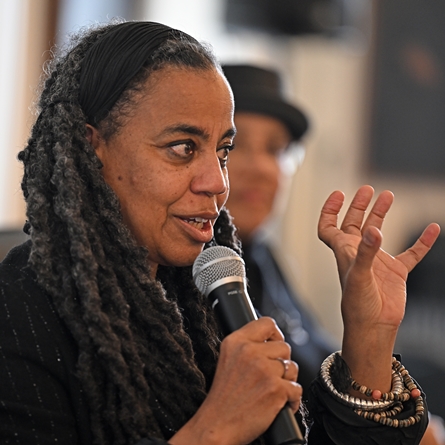
The Eugene O'Neill Theater Center hires new executive director
Tiffani Gavin recently signed on as only the fifth executive director in the Eugene O’Neill Theater Center’s legendary 55-year history and is the first woman of color to ever lead the celebrated organization. She has spent decades exploring every facet of the performing arts.
With experience in theater on both the creative and business sides, Gavin has served as managing director of the American Repertory Theater, executive producer at SFX/Clear Channel and manager of Broadway’s Marquis Theatre.
She is excited to use her know-how to build on the legacy of the center, located in Waterford, Connecticut, and to continue what has been a cherished partnership with Connecticut College. Conn is a founding academic partner of the center, a collaboration that has intertwined the institutions in beneficial ways, from sharing guest artists to establishing internships with the O’Neill’s National Theater Institute and its National Playwrights and National Music Theater conferences.
“The O’Neill has a legacy of letting people discover how to perform and how to write in a safe laboratory alongside talented professionals,” Gavin explained. “Writers and performers come in through the National Theater Institute and are able to take risks and learn from what works and what doesn’t work, so it’s a great early development opportunity that truly fosters long-term relationships.”
The O’Neill Center also owns the Monte Cristo Cottage, in New London, once the boyhood home of Eugene O’Neill himself, who remains the only American playwright to be awarded a Nobel Prize for literature. The cottage was the setting of his autobiographical play, Long Day’s Journey into Night, and is now a museum that has been restored to appear as it did when O’Neill lived there.
Robert A. Richter ’82, director of arts programming at Conn and an O’Neill scholar, said the center and cottage museum are major assets not only for Conn students but for scholars and O’Neill fans from around the world.
“The cottage and Connecticut College’s own Sheaffer-O’Neill Collection, in the Linda Lear Center for Special Collections and Archives at Shain Library, make New London a destination for national and international scholars interested in Eugene O’Neill and American theater,” Richter said. “Conn regularly holds classes at the cottage, and there is no better way to gain insight into America’s greatest playwright than to explore where he grew up.”
As the country confronts a racial reckoning, and the arts are increasingly committed to promoting diversity, Gavin says she sees an important continued role for the O’Neill Center to keep building on its reputation for valuing diversity and inclusion.
“The O’Neill has always had very diverse voices onstage. But I do think a place where theater in general struggles is finding racial diversity beyond the stage—beyond actors, beyond writers. There are more stories to be told that are more reflective of society as a whole, but that happens most effectively when you start diversifying the people in the room from the board level to management to designers and directors so that we have multiple voices,” Gavin said.
“The O’Neill has been and continues to be very committed to adding more people of color to the board and to administration, and I think that permeates through the entire organization and through our artistic discourse.”

